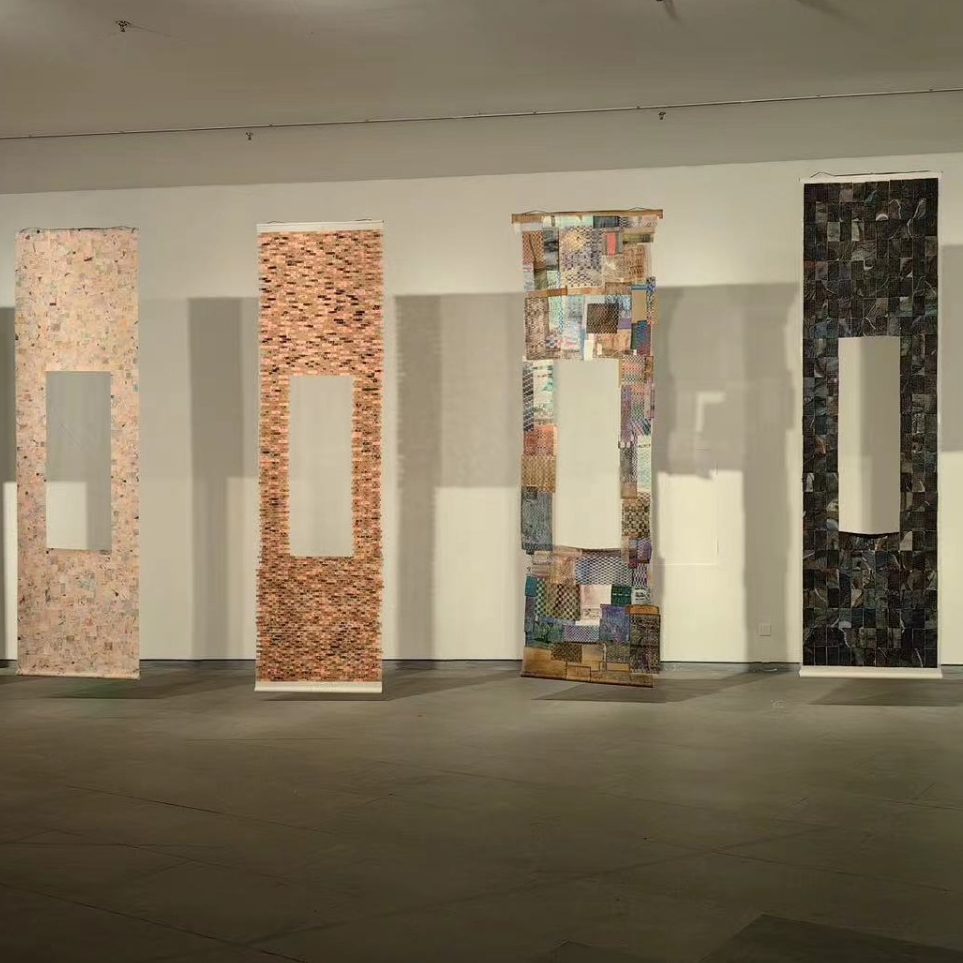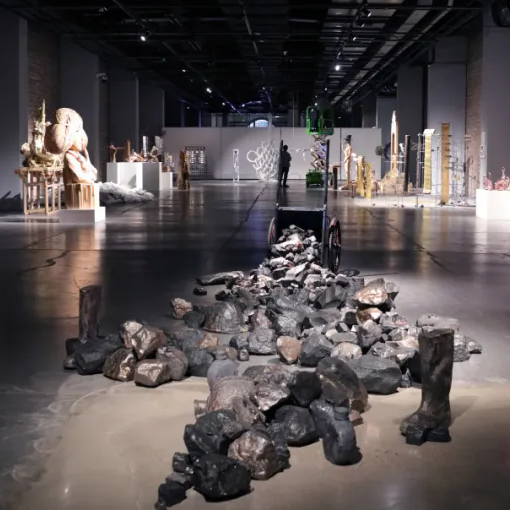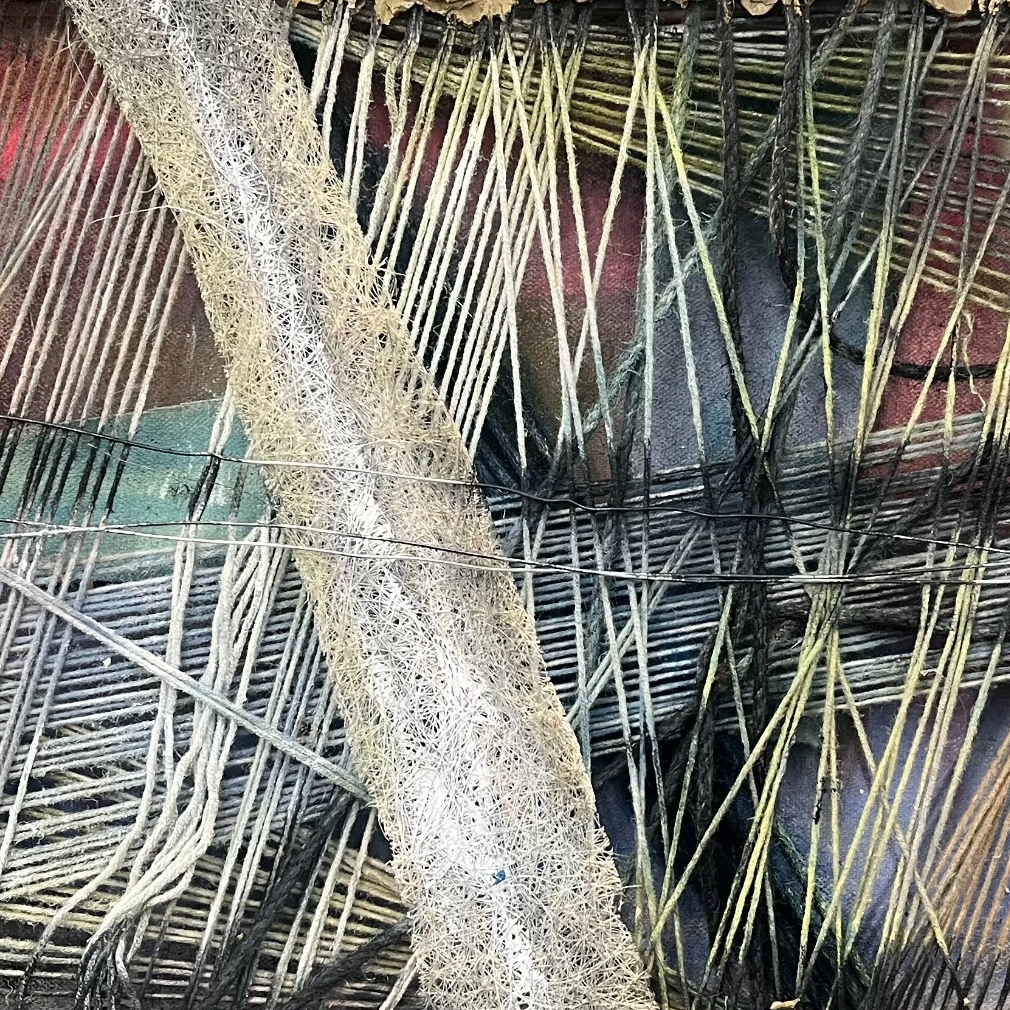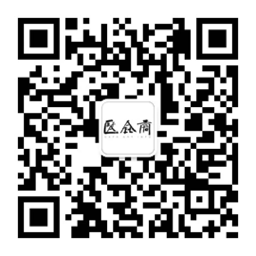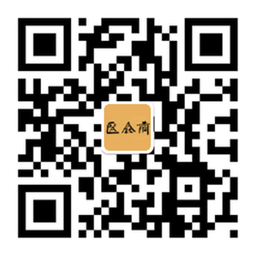Established in 2007, Eli Klein Gallery has held hundreds of exhibitions, organized numerous museum collaborations, and developed into its uniquely solid position in representing art from the East. “1.5,”is a group exhibition celebrating the Gallery’s 15-year journey in contemporary Asian art. While the “1” serves as a summary of the achievements and track record, the “.5” offers an impetus forward as they deeply believe that their program will continue to strengthen.
Corresponding to “1.5,” the curator of the exhibition Janet Fong has invited 10 groups of artists to provide one and a half pieces of art each, adding up to a total of 15 works. This format intentionally leaves some blank spaces, allowing uncertainties and voids in concepts to be treated as contents. At the same time, it signifies that we are using the one and half pieces of art, which are already completed, to connect the present with the past, and permit for future impact.
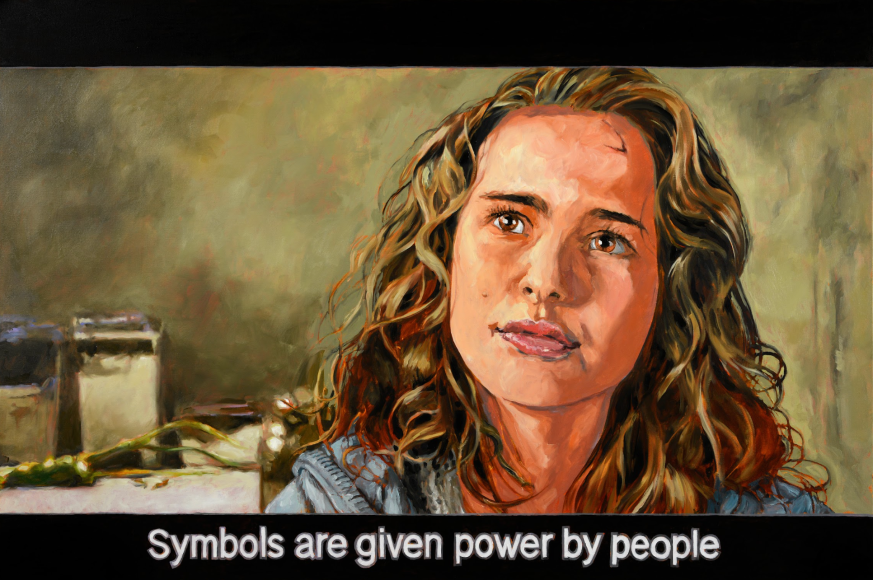
Chow Chun Fai, V for Vendetta Symbols are given power by people, 2021. Acrylic and oil on canvas, 100x150cm.
With a painting and a sketch derived from the movie V for Vendetta, Chow Chun Fai expresses his nostalgia for his time spent in 2018 as an artist-in-residence at the gallery. The film’s protagonist states that “symbols are given power by people,” which not only serves as a reminder of the cultural values of a free New York City, but also contains a message for the artist himself and for the future.
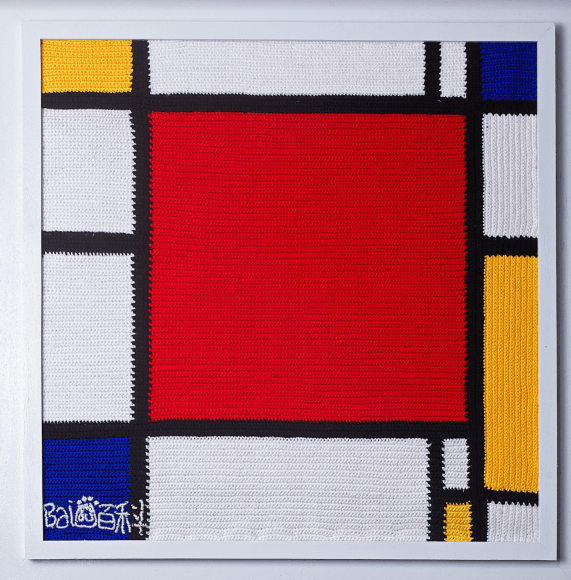
Hu Yinping, What Did the Masters Come to the East for? Mondrain Composition with Red, Blue and Yellow, 2021. Wool, cotton, fiber, wood, 85x85cm.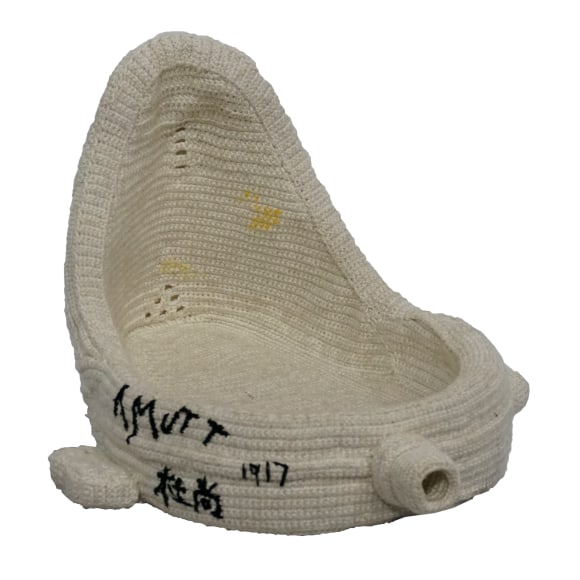 Hu Yinping, What Did the Masters Come to the East for? Duchamp Fountain, 2021. Wool, cotton, fiber, wood, 31x46x40cm.
Hu Yinping, What Did the Masters Come to the East for? Duchamp Fountain, 2021. Wool, cotton, fiber, wood, 31x46x40cm.
Hu Yingping’s What did the masters come to the east for consists of two pieces of work: Fountain by Marcel Duchamp and Composition in Red, Blue, and Yellow by Piet Mondrian. Classic works by Duchamp and Mondrian drew inspiration from everyday life, and Hu Yinping invited aunties from her rural hometown to reinterpret and create, with knitting needles and yarn, their own versions of these historical pieces. Thanks to the ingenuity and creativity of these aunties, seemingly inaccessible masterpieces that take a prominent position in art history have been transformed into 1.5 pieces of playful artwork.
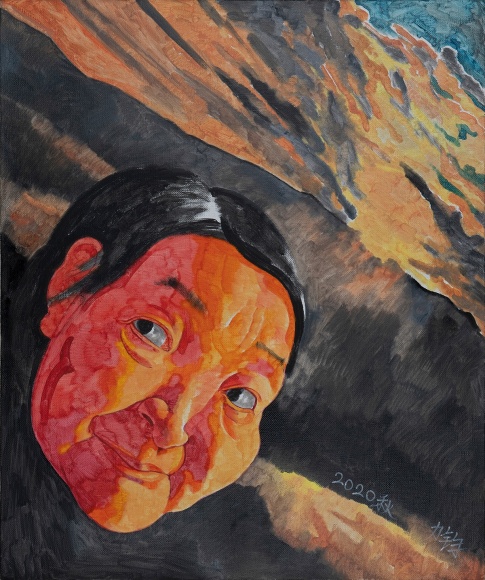
Fang Lijun, Fell 2020, 2020. Oil on canvas, 60x50cm
Fang Lijun uses two different forms of media oil-painting and ink-painting to interpret the differences between “one” and “half.” Oil-painting reveals Fang’s signature artistic approach, and ink-painting serves as a testimony to his relentless pursuit of change and breakthrough.
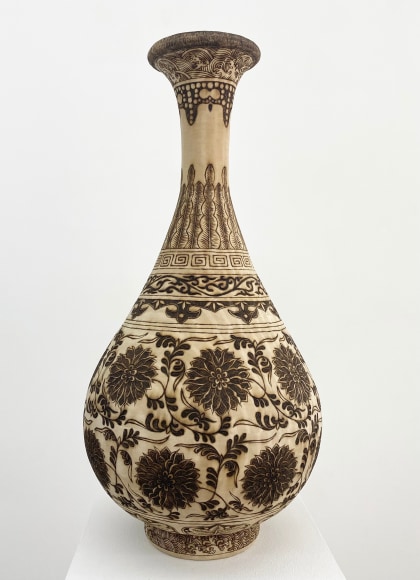
Li Hongbo, Peace, 2017-2022. Paper, 81x36x36cm.
One of Li Hongbo’s two paper sculptures is displayed in its entirety. However, half of the other work has been stretched to the ground, causing only a portion of this work to be visible to the audience. These sculptures featured in the exhibition mark a deliberate return to Hongbo’s previous collaborations with Eli Klein Gallery, a creative partnership with a history of more than ten years.
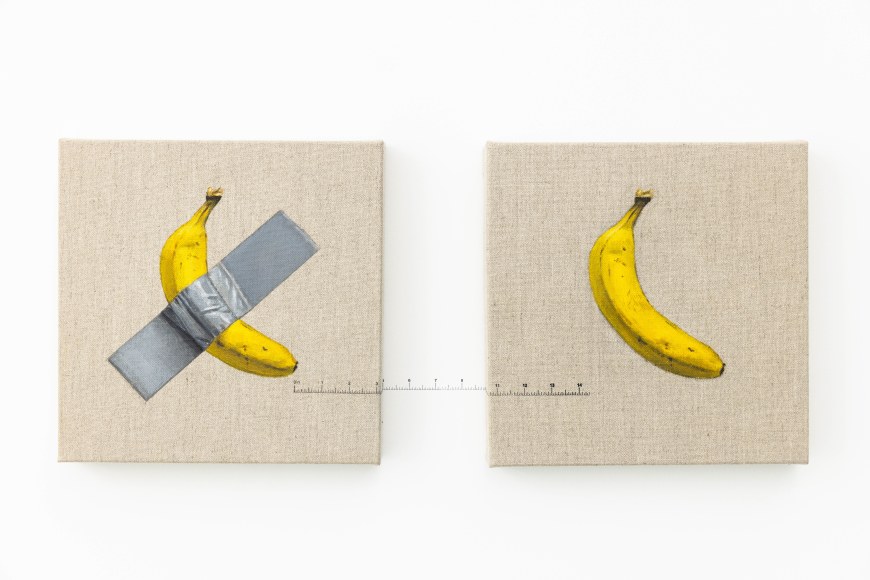
Shen Shaomin, Distance, 2022. Oil on canvas in two parts, 30x65cm, Each 30x30cm.
Shen Shaomin’s Distance consists of two oil paintings reflecting on Maurizio Cattelan’s banana installation. They appear to be two independent pieces of artwork, while in fact they are both incomplete halves which are only completed when put together. Shen Shaomin has marked out lines on the wall to connect these two pieces. Within a distance of 12 centimeters, Shaomin hopes to evoke reflections on the commercial market, and on the relationship between art and value.
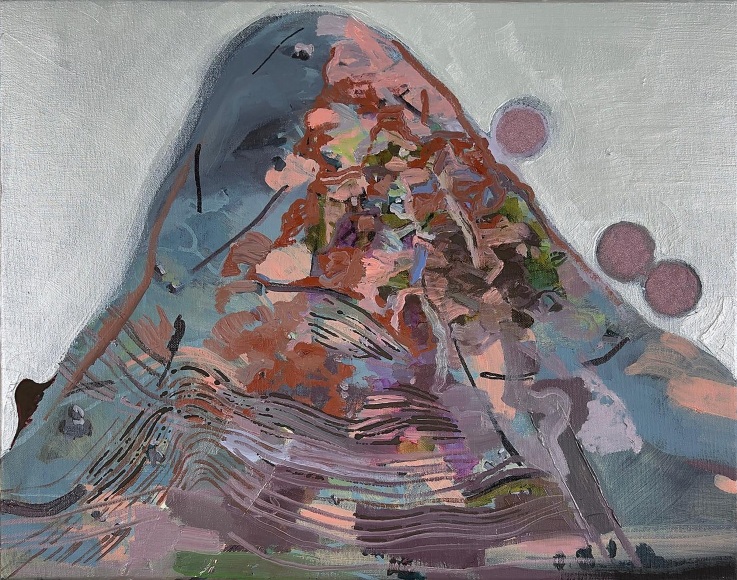
Kurt Chan Yuk Keung, The Solid One, 2021. Acrylic on canvas, 41x51cm.
Kurt Chan Yuk Keung presents a pair of paintings under the titles of The Solid One and The Melting Half, with the former measuring half the height of the latter. Both works explore the “ones” or “halves” involved in the image of imaginary landscapes in pre-human times.
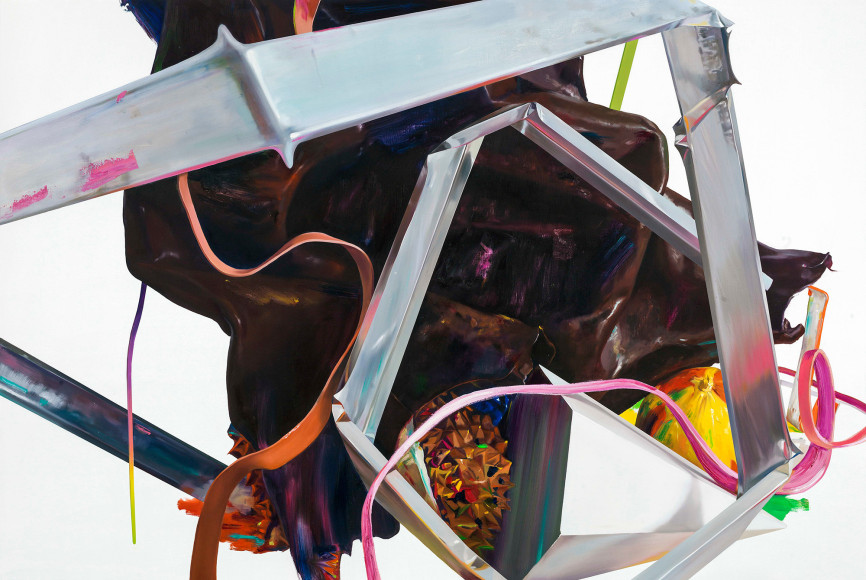
Shen Zhenglin, Samantha, 2014. Acrylic and oil on canvas, 122x182.5cm.
Juxtaposed with its prototype, Samantha, Shen Zhenglin’s Samantha1/2 is an interactive painting whose process and completion will be determined by the audience. The viewers are invited to pick a ring of their preference and fill that ring with a single random color, or with mixed colors. These interactions between the artist and the audience during the creative process symbolizes new connections and the uncertainties which exist between time and space.
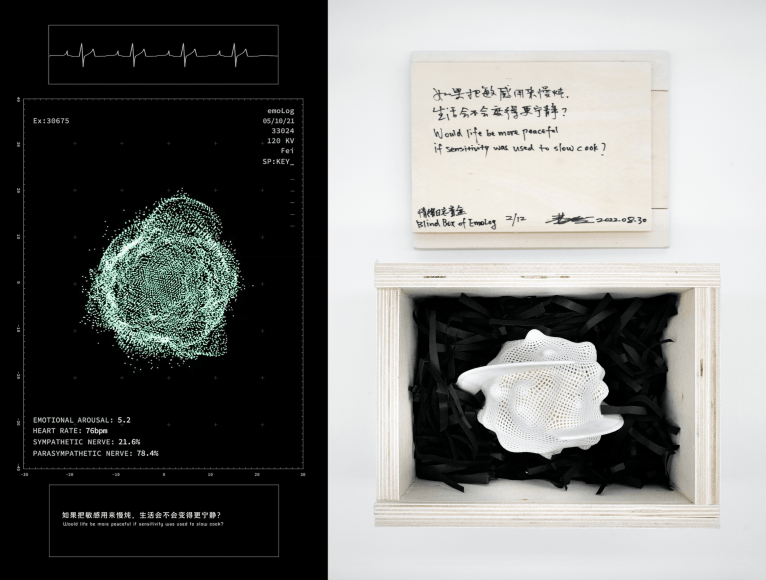
Fei Jun, Emolog, 2021. Sculpture Data generated image, blindbox, Video 16 seconds.
Fei Jun’s Journal of Emotions is an AI-generated, digital-image journal documenting the artist’s emotions. In a daily life where virtual experiences intertwine with the reality, our emotions are often affected by people and events around us, whether it’s in the physical world or the virtual one. Created through Human-AI collaboration, Journal of Emotions is an original piece of digital art featuring an interplay of subjectivity and objectivity. The piece includes a series of AI-generated digital images and randomly shaped, actual 3D sculptures - called “emotion blind boxes” - which build a seamless link between the real world and the virtual world, opening up a vast space for imagination.
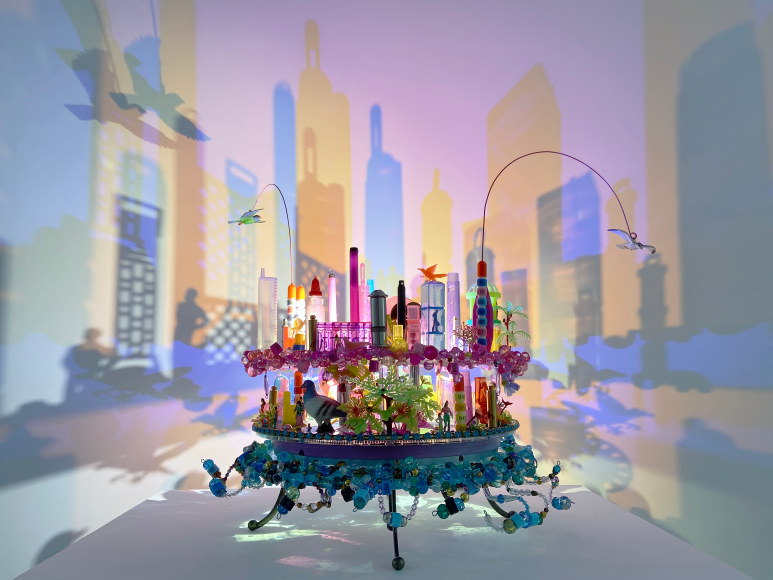
Angela Yuen, Urban Dove Fanciers, 2022. Whistles, brain training equipments, wires, perspex, plastic toys, beads, resin, LED lights, motor, gears, 41x40x58cm
Angela Yeun’s Urban Dove Fanciers elicits discussion about cities and freedom, initiated by the artist and portraying the relationship between dove fanciers and their birds. A cage installation titled Free as an Urban Dove? works as the “0.5,” questioning the subordinate relationships between the birds and their owners. Maybe this relationship is equally applicable in treating our relationship with the society which cages us and gives us orders.
And finally, the ground-breaking artist duo Sun Yuan & Peng Yu presents two installations, one in a seemingly stable format and the other in constant motion, echoing the post-pandemic socio-political systems around the world. On one occasion, an american flag was sewed intertwined between two shovels, creating a precarious stability. On the other hand, an experimental installation, acting as the “0.5,” consists of a moving plastic hand afloat of colored water, with its source of movement hidden underneath and invisible. With their continuous fascination in mechanics and potential energy, Sun Yuan & Peng Yu suggest the ways in which our societies are reminiscent of the functionality of machines, with its core logic sometimes apparent and sometimes concealed.
About the curator:
Janet Fong is currently a Guest Curator of Hong Kong Museum of Art (HKMoA)in 2019-2022 and a Research Assistant Professor (Curating) in Academy of Visual Arts, Hong Kong Baptist University (2020-present). She worked with different organizations for 23 years including CAFA Art Museum (Central Academy of Fine Art, Beijing), Osage (Art Foundation and Gallery), University Museum and Art Gallery (University of Hong Kong) and Hong Kong Maritime Museum and 1a space. Janet was also the curatorial consultant for Galerie Du Monde (2009-2017, HK), Eli Klein Gallery (2012-2017, New York), Weme Contemporary (2016-2018, Kuala Lumpur). Janet has curated numerous exhibitions with research since 2005 including ‘CITYA – Virtual and Physical exhibitions in Hong Kong, Rome, Tallinn, Beijing, Macao and San Francisco’(2021), “Two-year Research Art and Archival Exhibition: New Horizon – Ways of Seeing Hong Kong Art in 80s and 90s”, HKMoA (2021-2022); F.N.S.X. @ History of the Future, Cloud Art Museum, Shenzhen (2022);“Closer to the Beautiful World- Art exhibition”, Klein Sun for Asia Contemporary Art Week, New York (2017); “Fernando Botero - Botero in China: The Art of Fernando Botero”, National Museum of China, Beijing and China Art Museum, Shanghai (2015-2016) ; I was once there, Solo exhibition of Lam Tung Pang, Klein Sun, New York (2016); the First Shenzhen Biennale 2018 in Luohu Art Museum, Shenzhen.
About the exhibition
Dates: September 28 – November 19, 2022
Venue: Eli Klein Gallery
Address: 398 West Street, New York, NY 10014
Courtesy of Eli Klein Gallery.



